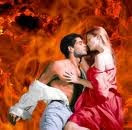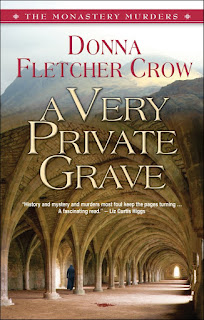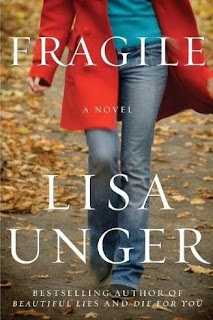Soapbox Stilettos: The Reading Habits of Men vs. Women
 The topic we picked to dish about this month on our Soapbox couldn’t come at a more timely moment. Not long after we selected it, Jonathan Franzen appeared on the cover of TIME Magazine, and Jennifer Weiner and Jodi Picoult spoke out on the unevenness of book reviews when it comes to fiction written by men vs. fiction written by women. So here’s the question we debated: why do you think (some) men are afraid to pick up books written by women? Especially novels labeled “chick lit,” “women’s fiction,” “cozy,” or “romance.” Why doesn’t it seem a problem for women to read books by male authors and female authors?
The topic we picked to dish about this month on our Soapbox couldn’t come at a more timely moment. Not long after we selected it, Jonathan Franzen appeared on the cover of TIME Magazine, and Jennifer Weiner and Jodi Picoult spoke out on the unevenness of book reviews when it comes to fiction written by men vs. fiction written by women. So here’s the question we debated: why do you think (some) men are afraid to pick up books written by women? Especially novels labeled “chick lit,” “women’s fiction,” “cozy,” or “romance.” Why doesn’t it seem a problem for women to read books by male authors and female authors?
Maggie: There is this perception that anything labeled “women’s fiction,” “cozy,” or “chick lit” will only appeal to a very small segment of the population: women who like that “kind of thing.” Most of these books are about people and relationships, however, and some of your coziest of the cozies delve into some serious and gruesome stuff (see my second book, Extracurricular Activities, where the most deserving villains end up without their hands and feet). Men like escapist literature just as much as women, I believe. Honestly, though, what man is going to pick up a book that has a pair of high heels and a martini glass on the cover? I think the way many women writers are marketed contributes to the idea that only women can read those (OUR) books. I can’t think of a more female-centered book than Wally Lamb’s first, She’s Come Undone, which I consider a literary gem. Had it been written by a woman, it would have been marketed in a completely different way and reached a much smaller audience, in my humble opinion, of course. I think more men would read books that fall squarely into the “chick lit” category if the books were packaged and marketed in such a way to make them be reflective of what they are: stories about people and their lives.
Susan: I have to agree with Maggie that there are often serious issues underlying fiction dismissed as “women’s” or “cozies,” only the packaging usually belies that. Where mysteries are concerned, those softer covers, often with tea cups or cats, are frequently made fun of by those who write darker stuff. I remember one author of serial killer stories in particular who regularly belittled cozy fiction in his talks. I’ve written both dark mysteries and light mysteries, and I actually found doing humor harder than serious stuff. My amateur sleuth novels were all packaged with candy-colored covers, and I didn’t mind at all that they were marketed to romance fans as well as mystery. My debut in women’s fiction, The Cougar Club, has a hot pink cover with a handbag on it. I would venture to say a man would have to be very sure of himself to buy such a book and read it in public! I buy books written by both sexes without thinking twice, and it would take a pretty freaky cover to turn me off. There’s definitely a double standard, but that’s life as we know it.
Evelyn: People do judge a book by its cover. Men are no exception. Just as we wouldn’t pick up a book featuring a guy wearing camouflage holding a gun, most men won’t pick up a book with a woman in an antebellum dress holding a bouquet of roses. The cover is a large and colorful but clear message about who the book is written for—and who the author is.
Susan: A guy friend of mine once emailed to say, “I was reading Blue Blood on the subway and got a lot of strange looks.” I applauded him for being so brave since Blue Blood has a typically chick lit cover that’s bright yellow with cartoonish women’s legs on it. Which has me wondering if electronic readers will begin to change the book buying habits of men at all because no one can see what you’re reading. Hmm.
Rachel: I don’t think men are “afraid” to pick up women’s fiction. I think the presumed topics in those novels just don’t interest them, and that’s fair. Just a few weeks ago, a guy friend who read an ARC of my new book, Dead Lift, said he didn’t expect to like it as much as Final Approach because, where the first novel was set around skydiving, this one is set (partially) in a spa. The interesting thing is that he did end up liking the story despite its more feminine setting. This is where I think men and women differ. Women are more likely to pick up books that are more “manly” if there’s a good mystery driving the plot. But what man wants to be caught with a book that has a pink, sparkly high heel shoe on the front? Final Approach was originally edited by a male author of many romance novels. He published them under a female pseudonym. I wonder how many women are writing as men.
caught with a book that has a pink, sparkly high heel shoe on the front? Final Approach was originally edited by a male author of many romance novels. He published them under a female pseudonym. I wonder how many women are writing as men.
Misa: Raise your hand if you know the gender of Harper Lee. Uh-huh. It’s a book that’s highly recognized by men and women, but how many men think Harper’s a man? Okay, this isn’t really a reason, but I’m just saying.
Rachel: It might be the case that men assume novels written by women will deal primarily with women’s themes or that they will be softer novels. In many cases, I’d agree that’s true. When I think about books by male authors, though, none come to mind that were predominantly driven by “guy themes.” Male protagonists seem more career-driven with relationships on the periphery, and that’s okay with me. I suppose a man picking up a book with a female protagonist may tire of her endless pursuit for dates, preoccupation with her weight, or frustrations with her in-laws. The unfortunate thing is that many books by female authors do not focus on these things. We all have to keep an open mind, folks. There’s something out there for all of us to read.
Evelyn: We’re generalizing here, but it’s a pretty safe generalization. Men don’t want to talk about emotions, theirs or anyone else’s. They certainly don’t want to read about them.
Misa: Men show a huge lack of interest about personal introspection, family, and/or domestic elements in their book choices. We’re still ingrained with the age old gender differences, and reading choices reflect that. Women acknowledge that fiction can give guidance or solace but with men…not so much. They keep emotion bottled up. Books written by women tend to have more emotion built in and for a man to read such a book would, by association, mean he has those emotions, too, and he just doesn’t, right?
Evelyn: We believe that men who do read fiction are drawn to themes, more likely than not, written  by other men, such as Westerns, military themes (think Tom Clancy and The Hunt for Red October), and adventure.
by other men, such as Westerns, military themes (think Tom Clancy and The Hunt for Red October), and adventure.
Misa: Men read angst-ridden books in which the struggle to overcome some catastrophic circumstance is at the core of the plot. Don’t women write this type of novel? Sure, as long as there’s emotional growth woven in. Ah, emotion, there’s that word again. Men only like adventure and triumphing over adversity just as women only like romance and love. God, it’s great to be a stereotype, isn’t it?!
So what do YOU think? We’d like to hear your thoughts on the subject, too!








